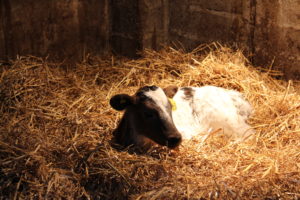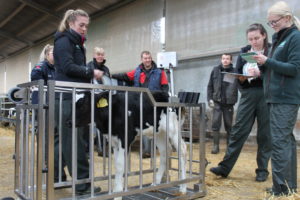NWF Agriculture Technical Manager, Abbi England, explains how implementing the correct calf rearing programme can give dairy farmers the key to unlocking the full potential of their calves, leading to significant increases in herd productivity. Heifer rearing is the second-highest cost of dairy farming. NWF has found great success in implementing the LifeStart programme alongside the 5 Critical Control Points (5C’s) developed by Trouw Nutrition.
“LifeStart has been identified as a proven approach for rearing healthy calves by quantifying and promoting calf rearing best practice. Easily followed protocols and advice meaning farmers can help calves grow and develop into productive cows faster, with improved first lactation milk yields leading to improved profitability and efficiency”, says NWF Technical Manager, Abbi England.
Colostrum
Following colostrum management protocols based on the 4 Q’s below will help get calves off to the best possible start. Quality: good quality colostrum should contain at least 50g of IgG per litre and have minimal bacterial contamination (<100,000cfu/ ml). Quantity: best practice recommendations are to supply 10% of calf bodyweight which equates to around 4 litres of colostrum for the average Holstein Friesian calf. Quickly: calves have a short-lived ability to absorb immunoglobulins, to optimize antibody absorption colostrum should be fed as soon as possible after birth, at the latest within 6 hours. Quietly: to reduce stress on the calf, colostrum should given in a quiet manner. Continuing to feed colostrum for the first 3-4 days before moving to calf milk replacer (CMR) or whole milk offers additional benefits.
Calories
A workable and sometimes delicate balance must be struck between the economic realities of the farm and the need for a predictable and successful path from calf to a cow. Whole milk and CMR exist in a number of forms, each with a different impact on health, performance and convenience. It is important to understand the specifications of products on offer, raw material digestibility, nutrient specification and balance are all aspects that contribute to the overall quality of a CMR. Rearing objectives must be set in order to decide which liquid feed solution will be easiest to manage whilst meeting the calf’s full nutritional needs for optimal growth.
The LifeStart Programme includes a new unique approach to the formulation of CMR. Based on comprehensive research, all LifeStart endorsed CMR has a specific nutrient profile to optimise the growth potential of a calf. Research has shown that an elevated plane of nutrition in the critical first eight to ten weeks leads to increased pre-weaning average daily gain which can have a significant impact on lifetime productivity. “NWF has both Whey based and Skimmed milk-based LifeStart accredited CMR available. LifeStart aims to deliver an optimised first lactation milk yield due to enhanced mammary development which is essential for the future productivity of the cow” says Abbi England.
The amount of CMR required will depend on calf bodyweight, desired daily live weight gain, environmental temperature and nutritional composition. Improvements to the nutritional regime of the calf can decrease mortality and disease susceptibility and increase the rate of body weight gain. Aiming for a minimum target of double the calf’s body weight from birth to weaning will ensure the calf is optimising growth rates which will support calf health and overall performance.
Comfort and Cleanliness
The growth potential of a calf cannot be optimised with a nutrition programme alone, farmers need to simultaneously consider management practices that impact on calf performance too. Calves can spend between 17 to 19 hours a day lying down, so it is essential that their environment is kept comfortable with adequate lying space, air space and ventilation. Calves are born with no immunity against disease and are highly susceptible to bacterial, viral and parasitic challenges. Calf health and survival is a balancing act; maximising immunity with excellent nutrition while minimising the risk of infection by implementing structured and consistent hygiene protocols on farm.
Consistency
Consistency is an important but often overlooked aspect of calf rearing which may help improve calf performance for little or no added cost. In simple terms, calf management should be as consistent as possible. Daily nutrient variations through things like inconsistent mixing of CMR are more challenging for the calf to manage which can induce stress on calves, leading to detrimental effects on health and performance. Research has shown that daily variation in CMR intake can lead to reduced average daily gain when compared to calves fed a consistent daily amount. Calves thrive on routine; so implement simple and clear protocols that ensure calves are treated consistently on a day to day basis, even when different people are left in charge of calf management.
“Only the correct combination of appropriate management and quality nutrition will optimise calf performance. Therefore, all aspects of calf rearing must be considered, with consistency and feeding to a schedule being a key component of the programme” adds Abbi England.
For more information contact your local NWF Sales Specialist, or alternatively get in touch with our technical team HERE
